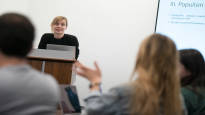WASHINGTON A couple of dozen students sit at tables arranged in the shape of the letter U and have a lively discussion about whether the former president of the United States Donald Trump a threat to democracy. There is a Finnish professor at Georgetown University Pauliina Patana a course on populism and democracy.
Discussions play a significant role in the course, but this fall activity in classes will be emphasized even more.
The comments made in the classroom are a sample of the student’s own thinking. It is no longer possible to tell from essays done at home whether the student has done them himself. Artificial intelligence has changed everything.
– Last spring, we were still laughing with other teachers and professors about what will become of this when artificial intelligence becomes more common. Now it has been impossible not to take into account the effects of artificial intelligence and how it has revolutionized learning and teaching, says Patana.
Back to pen and paper
The impact of artificial intelligence on university life has been the hottest topic of conversation around the United States this fall, when professors have been thinking about their relationship with course assignments and university applications made with the help of artificial intelligence.
A common line has not been formed nationwide or even per university. At Georgetown, every professor has their own idea of how students can take advantage of AI.
Patana says that some professors today assign essays in class using the traditional pen and paper method. Some, on the other hand, try to recognize the texts produced by artificial intelligence with the help of recognition programs.
Patana himself views artificial intelligence as a tool that students can use to thoughtfully work on routine tasks, such as making journal reviews or visualizing presentations.
For a more analytical task, such as writing an essay, Patana expects students to do the thinking work themselves. So far, no one has – at least as far as he knows – returned a course assignment produced by artificial intelligence to him.
Perhaps it is, because the students of Patana seem to be very suspicious of artificial intelligence.
Plagiarism, wrong information and the futility of cheating
Studying international politics Lily McCullough says that he recently tried artificial intelligence to help him with a school assignment. He had to watch an old Spanish movie. McCullough asked the AI to summarize the plot of the movie first to understand what the movie is about.
– After watching the movie, I realized that all the manipulations of artificial intelligence were wrong, starting with the characters and plot of the movie. I hadn’t realized it could have so many inaccuracies.
At Georgetown, it is quite common for students to read about a hundred pages of material for each lecture. Some of the students have used artificial intelligence to summarize the lecture materials.
Alex Missen says that he submitted job applications with artificial intelligence, partly because job applications are read by artificial intelligence, and artificial intelligence prequalifies job applicants.
However, artificial intelligence did not convince Missen, as the applications scurried away like robots. Because of that, he also doesn’t feel that he can use artificial intelligence to write essays. According to him, artificial intelligence is not capable of high-quality thinking.
Students don’t think that using shortcuts makes sense at all, because they pay a lot for learning. Georgetown tuition is nearly $60,000 for one year.
– I’m already lucky when I’m here. My parents have supported me a lot. Also, I don’t get scholarships, so I pay the full tuition. I want to make the most of this, so I don’t want to take shortcuts, for example by using artificial intelligence, says Julio Wang.
Critical media literacy more important than ever
According to Pauliina Patana, it is important that students learn to use artificial intelligence, because in the future different artificial intelligence applications will be used more and more.
He also thinks it is very important that students learn to approach artificial intelligence critically. It is also related to the ongoing lecture series.
– Populist political movements have already utilized artificial intelligence. With the help of artificial intelligence, it is easy to create content that imitates traditional media but spreads stereotypical or false messages, says Patana.
With the help of applications like ChatGPT, it is easy to produce endless content, making it even more difficult to separate fact from fiction.
According to Patana, artificial intelligence can create fertile ground for populism. According to him, artificial intelligence will revolutionize the world and working life. Many may fear for their own livelihood and future.
– The populist parties have risen to power precisely by trying to politicize the losers of globalization, and here we see quite a similar dynamic. Political decision-makers must take this seriously, as artificial intelligence can have wide-ranging effects in this way as well, says Patana.
What thoughts does the story evoke? The topic can be discussed until October 4th at 11 p.m.
